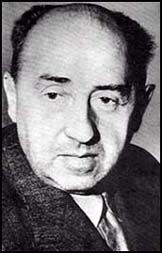 |
Walther Funk was a senior Nazi Party official who served in Adolf Hitler’s cabinet as Minister of Economics. Funk also served as President of the Reichsbank.
Walther Funk was born in Trakehnen, East Prussia, on August 18th 1880. It was quickly apparent to his family that he was a very able boy in a great number of subjects. From school Funk went to the University of Berlin where he studied economics, philosophy and law. Funk was drafted into the German Army in 1916 but received a medical discharge as a result of ill-health.
Funk then joined the staff of the ‘Berliner Boersenzeitung’, a conservative newspaper. In 1920, he became chief editor of its business section. From 1922 to 1932, Funk worked as the newspaper’s editor.
Funk, along with many others in Weimar Germany, was an ardent nationalist and he had no faith in the politicians who governed Germany then. Funk believed that Germany needed strong leaders who would push Germany back to greatness. In 1931 he met Adolf Hitler and he was quickly taken in by him. Hitler was also impressed with Funk and made him his personal economics advisor. Funk advised Hitler that the best way forward for Germany in terms of getting out of economic depression was to embrace public work schemes based around a huge road building programme. He also saw a huge expansion in the car industry as a way forward as well as a way for Germany to show the world that Germany was now back as a world power. New autobahns and a mass of new cars using them was, Funk believed, a very overt message to the world. Funk also believed that Germany needed to be more self-sufficient in terms of food production and less reliant on foreign food imports. Therefore he advised that there should be a massive expansion in agriculture.
In March 1933, Funk was appointed Press Chief of the Reich government and Under-Secretary of the Reich Ministry for Public Enlightenment and Propaganda. His immediate superior was Joseph Goebbels. Funk also sat on the board of directors of the Reich Broadcasting Company. In 1938, he succeeded Hjalmar Schacht as Minister of Economics and in 1940 he took over Schacht’s other post – President of the Reichsbank. With these two positions, Funk had control over Nazi Germany’s economic and financial policies. In 1942 Funk agreed with Heinrich Himmler that the Reichsbank would receive valuables taken from those who had been sent to the death camps. It is said that Himmler made it clear to Funk that no questions were to be asked about where the valuables came from – the Reichsbank was simply there to look after them.
Funk was a diligent and loyal party man. He fervently believed that Hitler was the only man who could save Germany from communism. He used the skills he had acquired working in newspapers to all-but eulogise what Hitler was doing for Nazi Germany. Some, such as Schacht, held him in contempt but this may have been because Funk replaced him in both of his high ranking positions. Others saw Funk as a loyal party functionary who gave what was needed to Hitler and therefore, de facto, to Nazi Germany.
Funk was arrested at the end of the war and on October 20th 1945, he stood before the International Military Tribunal held at Nuremberg. Funk was charged with crimes against peace, war crimes and crimes against humanity. He claimed his innocence and stated that he knew nothing about the crimes that had been committed by the Nazi regime both in Germany and in Occupied Europe.
“I have never in my life consciously done anything that could contribute to such an indictment. If I have been made guilty of those acts, through error or ignorance, then my guilt is a human tragedy and not a trial.”
It was a defence that fell on deaf ears. The tribunal simply did not believe Funk when he said he had no idea where the gold, jewels and money came from when it arrived at the Reichsbank guarded by the SS. It went into the ‘Max Heileger deposit account’ and the tribunal believed that Funk knew full well the origins of the money etc. The tribunal also believed that he knew full well that his economic planning was geared towards war. Funk was found guilty and sentenced to life in prison. However, because of his ill-health Walther Funk was given an early release from Spandau Prison on May 16th1957.
Walther Funk died in Dűsseldorf on May 31st 1960.
April 2012